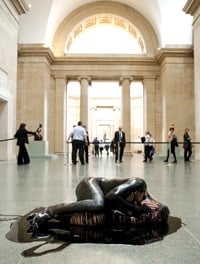Take the money and run?
Jane Trowell shines a light on the issues that arts organisations will be faced with if they prepare to gear up their drive for sponsorship

In hard times for state arts funding, it’s tempting to throw caution to the winds, put your reservations on hold, and go for funds from whoever – including those businesses you would normally hope to avoid. As Christopher Frayling memorably said in the context of BP’s Deepwater Horizon disaster and BP’s funding of Tate: “This is not the time to be squeamish.”*
Yet arts groups and organisations can be damagingly split by divisions on ethics and sponsorship. Dissent can come from anywhere, not just senior management, the fundraising team or Board of Trustees. In the late 1990s, Platform and Artists Agency led a two-year national project called ‘Funding for a Change’, which engaged over 150 individuals and organisations from the arts and voluntary sector. We ran workshops where participants compared experiences on ethics and sponsorship. There were indeed horror stories about staff, audience and membership dissent, and also about compromised practice because of conditions set by sponsors. Worst of all were examples of when self-censorship crept in.
Together with Liberate Tate and Art Not Oil, Platform picked up the public strand of this work again in 2010, after Deepwater. Since then, dozens of artists, groups and arts organisations – and the wider voluntary sector – have approached us to talk about sponsorship. Is it any wonder? The draconian cuts which Arts Council England (ACE) is required to mete out are causing desperate times for many, yet ACE’s £100m ‘Catalyst’ private-giving investment programme drives us towards sponsorship. Arts organisations will be increasingly encouraged to upskill, learn corporate-speak and work with business, following the US model.
Arts & Business (A&B) has commented that the ethics of companies is none of their business.** This is not surprising in a free-market approach. If “All money is dirty money”, as stated by Alex Beard, Deputy Director of Tate,*** then the field is indeed wide open and it’s art’s job to clean it up.
But we would argue that both A&B and Beard are being disingenuous here. Arms manufacturers and pornography are considered by many to be out. Tobacco and alcohol similarly, especially for projects with vulnerable groups. Some arts organisations who work in health contexts feel that cosmetics and big pharmaceuticals are a no-no. Others wouldn’t take funding from McDonalds, and yet Burger King is OK. Tesco is a long-term funder of the Gay Pride festival, a fact which some argue is excellent. Yet for others, Tesco is problematic.
In the UK, most arts organisations are relative newcomers to business sponsorship. Conversely, brand consultants and marketers are extremely sophisticated in their thinking: business gets credibility and cultural capital from the association. What a relief for BP to know that their damaged brand of 2010 would be ‘cleaned up’ in 2012 by major sponsorship of the Olympics, Tate, Royal Opera House, National Portrait Gallery and British Museum, etc. Arts & Business’s commissioned think-piece “Using art to render authenticity to business” should give us pause for thought.
So, how do you arrive at decisions without splitting staff or antagonising your audience? What are your constraints? How will you deal with dissent from within or outside? And above all, how do you get to a position of strength and integrity, whatever your difficult choices? The answer lies in undergoing a process to create an ethical funding policy that thoughtfully reflects your needs and values. This policy may be made public or remain an internal guidance document, but its existence will be invaluable, helping you to calmly frame discussions when difficult situations arise.
Join the Discussion
You must be logged in to post a comment.